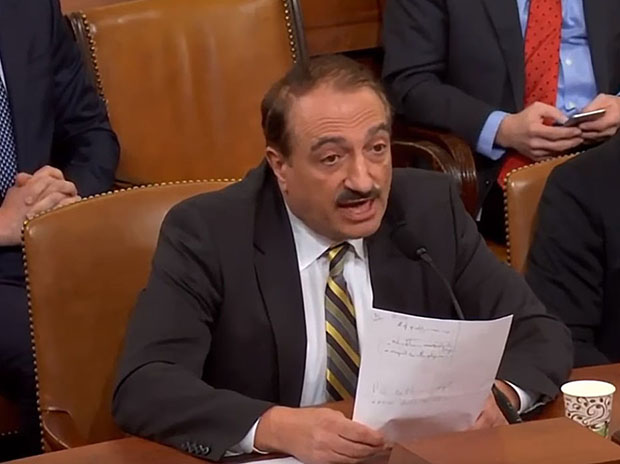
By Alexander Germanis
When the twin cities of Bloomington and Normal are mentioned in conversation, rarely does that conversation then lead to innovation, pioneering, or national representation in the field of medicine.
Perhaps it’s time for that to change.
Being surrounded by Illinois’ sea of prairies, Bloomington-Normal, while easily forgotten, is the home of physicians like Dr. Ramsin Benyamin, founder and director of Millennium Pain Center, a doctor who is representing not only our community, but the entire nation in efforts to provide safer health care for citizens everywhere.
Just this February, Dr. Benyamin was chosen to speak before the United States House of Representatives Ways and Means Committee, the oldest committee in Congress and the chief tax-writing body in the U.S. government. Since the 20th century, the Ways and Means Committee also presides over “revenue-related aspects” of Medicare.
As money and medicine are, unfortunately, inseparably connected, the House Ways and Means Committee finds myriad health-related aspects under its jurisdiction: anything having to do with health insurance premiums, healthcare costs, payments for health research and/or delivery systems, or bills relating to Social Security healthcare programs.
Dr. Benyamin brought one of those medical issues before the Ways and Means Committee, namely, as the doctor put it when he testified before them, “how we can remove barriers to prevent and treat opioid abuse and dependence in Medicare.”
Although the term “opioid” has come to include opiates — drugs derived from opium — an opioid originally referred to a synthetic narcotic not directly derived from opium but with opium-like effects. For a long time, opiates had been a common tool in relieving a patient’s pain.
Unfortunately, they are not and never have been a cure for painful ailments, but rather serve a palliative function.
As a pain specialist, Dr. Benyamin is intimately familiar with not only the most common painful ailments, but also the consequences of not taking care of those problems quickly. “Spine degeneration, disc herniations, spinal stenosis, headache, pathologic fractures, and post-surgical chronic pain, if not managed timely by interventional pain techniques, will result in more invasive and costly procedures,” he explained, “raising the risk of dependency on more or higher doses of opioids.”
Dependency on opioid medication, even prescribed opioid medication, can carry with it numerous potential dangers. Preventing that dependency is what Dr. Benyamin and the American Society of Interventional Pain Physicians (ASIPP) are attempting through their actions.
The numbers regarding opioid use are very surprising. “Currently one in every three Medicare recipients is on prescription opioids,” said Dr. Benyamin.
As a former president of the ASIPP and a current board member, Dr. Benyamin and his colleagues have been acutely aware of the dangers of opioid medication. In order to curb the overuse of them, back in the year 2000 they proposed a national drug-monitoring program. This system, called the National All Schedules Prescription Electronic Reporting Act (NASPER), became a state-run drug monitoring program beginning in 2005 and was eventually instituted, in some form, by all 50 states.
“These pain clinic laws have shown to reduce the amounts of opioids prescribed by eight percent and prescription opioid overdose death rates by 12 percent,” Dr. Benyamin reported. “Also, they have resulted in large reductions in heroin overdose death rates as of 2015.”
Unfortunately, opioid abuse and opioid-related deaths continue to be a major issue. So, Dr. Benyamin and the ASIPP are petitioning for better legislative efforts through a three-tiered program, “to curb opioid abuse and reduce opioid deaths, maintaining appropriate access, and also the promotion of no-opioid modalities like interventional pain techniques.”
Although this will not be the first time Bloomington’s Dr. Benyamin has been a part of American medical history, each step he and his colleagues take bring them closer to making the country’s health care system work for the increased benefit of the patient.
To learn more about Dr. Benyamin and the ASIPP’s plan for Congress, read next month’s issue of Healthy Cells Magazine.
For more information on any type of pain, you may contact Millennium Pain Center at 309-662-4321 or www.millenniumpaincenter.com. Their new office is located at 2406 E. Empire in Bloomington. The practice provides the most advanced and comprehensive pain management for a wide variety of conditions. Drs. Benyamin and Vallejo have been selected among 70 of the Best Pain Physicians in America.

